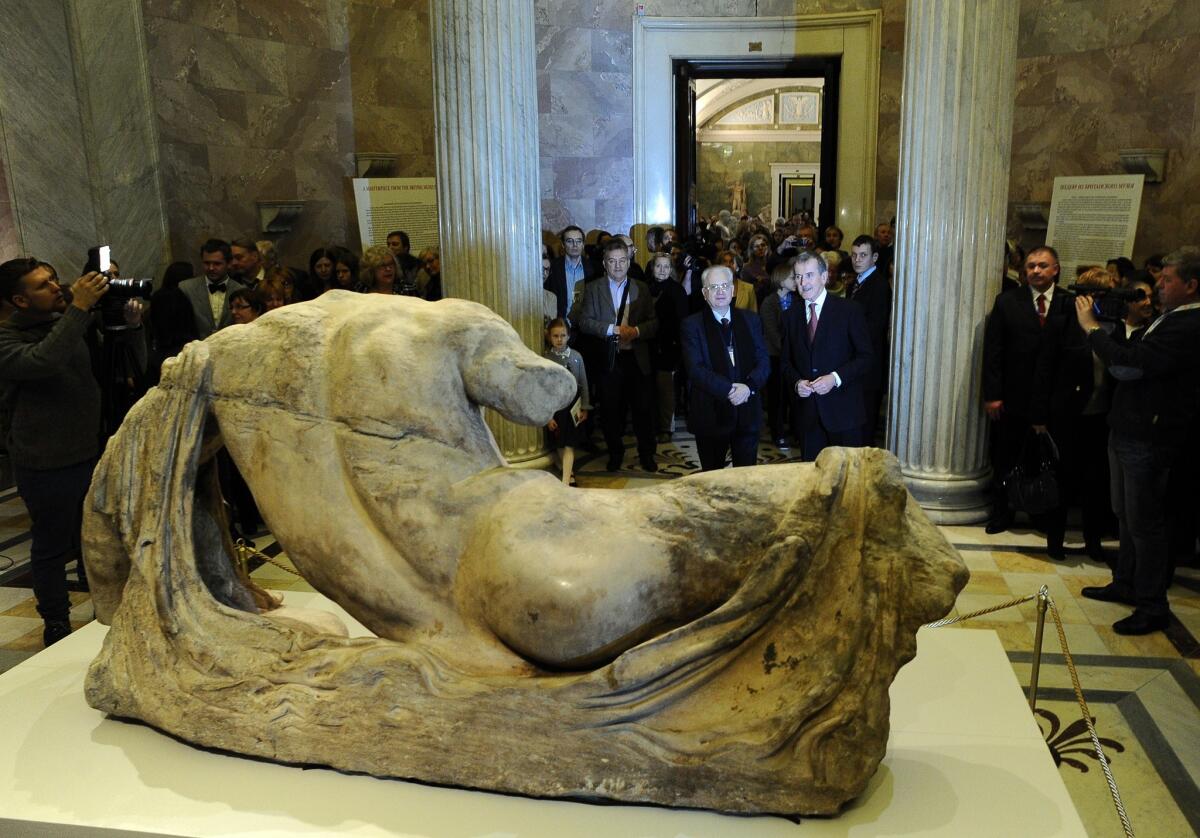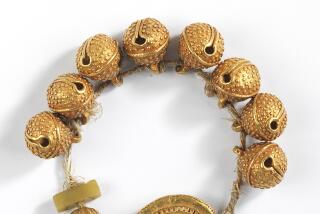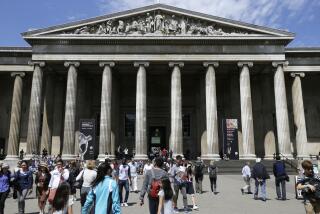Loan of Elgin Marbles piece to Russia spurs several controversies

- Share via
The British Museum’s decision to lend a piece from the disputed Elgin Marbles collection to Russia’s Hermitage Museum ignited disputes across Europe on Friday, with the Greek government condemning the cultural overture as “an affront to the Greek people.”
It was the first time any piece of the marble sculptures stripped from the Parthenon by a British diplomat nearly 200 years ago had been allowed out of the London museum’s custody. The British Museum’s trustees have been battling legal efforts by Athens for decades to have the priceless artifacts returned to the temple they adorned for more than two millenniums.
The 5th century BC sculpture of headless river god Ilissos was lent to the Hermitage in Saint Petersburg as part of special exhibits marking the 250th anniversary of the resplendent museum’s opening in the Russian imperial capital.
The cultural gesture was kept secret until Friday, a day ahead of the opening of the Hermitage exhibit to the public.
British Museum Director Neil MacGregor lauded the display that will run through mid-January as an opportunity for Russians “to see this great moment of European art and European thought.” He said he hoped Greeks would be “delighted” by the spotlight on their ancient culture.
“I hope that they’ll be very pleased that a huge new public can engage with the great achievements of ancient Greece,” MacGregor said in an interview with the BBC. “People who will never be able to come to Athens or to London will now, here in Russia, understand something of the great achievements of Greek civilization.”
Greek Prime Minister Antonis Samaras was anything but pleased.
“The Parthenon and its sculptures were looted,” Samaras said in a statement carried by ekathimerini.com and other Greek media sites. He reiterated Athens’ demands that the priceless artifacts be returned to their homeland and said the loan to Russia exposed the British Museum’s contention that it alone is qualified to host the treasures as “British dogma.”
Thirty-two panels and sculpted figures from the Parthenon were removed and taken to London by Lord Elgin, Britain’s ambassador to the Ottoman Empire, in 1816, when Greece was under Turkish rule. The British Museum, which claims ownership of the marbles and sole authority to negotiate their disposition, argues that Elgin, an art lover, had the permission of Ottoman authorities to remove the artworks from the temple that had fallen into disrepair.
The first-ever loan of the contested marble sculptures was also criticized for its timing, with Russia the target of European Union and U.S. economic sanctions for its seizure of Ukraine’s Crimea region and aid to pro-Russia separatists battling the Ukrainian government.
“Does anyone remember Malaysia Airlines Flight MH17, the one shot down by Russian-backed separatists over Ukraine in July?” asked Hugh Muir in his column for the Guardian newspaper in which he chastised the British Museum for a business-as-usual approach to the Russian government.
“Think about the sanctions. What are they for? The concept is surely to show Russia that it cannot behave as it has been doing and expect life to continue as before,” wrote Muir, who said he lost a friend onboard the doomed Malaysian airliner in which all 298 on board perished.
“The logic is that bad behavior must impair the country’s relationship with other critical countries around the world,” he added, “and that when the repercussions of that starts to bite at home, the social and economic backlash might force a leader such as [Russian President Vladimir] Putin to modify his behavior.”
MacGregor, in a blog post, said the British Museum trustees “have always believed that such loans must continue between museums in spite of political disagreements between governments.” He said his Russian counterparts “energetically shared” that philosophy.
Relations between Russia and Western Europe are at a post-Cold War low over Putin’s aggression against Ukraine and his challenges to the authority of NATO and the European Union to include former Soviet republics in the alliances.
Follow @cjwilliamslat for the latest international news 24/7
More to Read
Sign up for Essential California
The most important California stories and recommendations in your inbox every morning.
You may occasionally receive promotional content from the Los Angeles Times.













